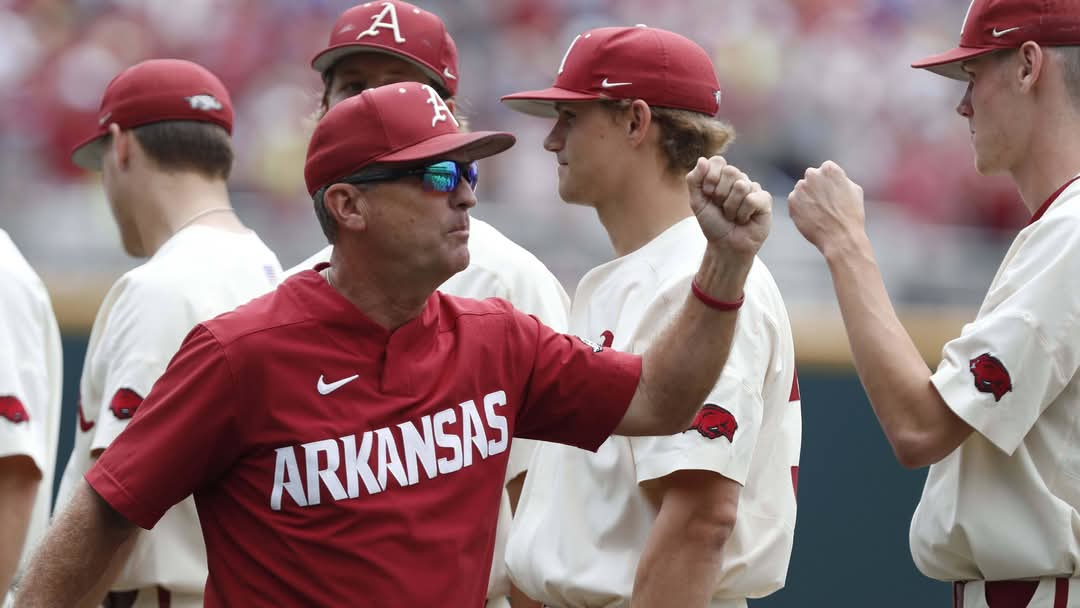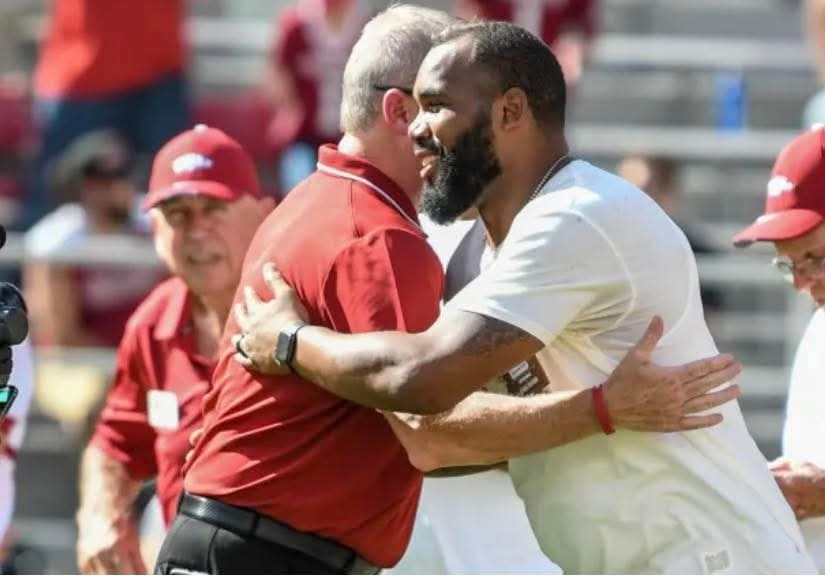Arkansas Razorbacks head coach Dave Van Horn has made it crystal clear: he stands firmly behind his longtime hitting coach, Nate Thompson.
Despite receiving intense scrutiny from some fans and critics, Thompson’s value to the program is not only evident through statistical success but also through the unwavering support from the man at the helm of Arkansas baseball.
Nate Thompson, currently in his eighth season as Arkansas’s hitting coach and recruiting coordinator, has often been unfairly blamed for any dip in offensive performance, especially when it hasn’t aligned with the team’s consistently strong pitching. However, many of these criticisms ignore the broader context of Thompson’s tenure—context that Van Horn, a respected and experienced leader in college baseball, emphasized recently in a passionate defense of his colleague.
Under Thompson’s guidance, the Razorbacks have become one of the most dangerous offensive units in college baseball. The numbers back it up. Since Thompson joined the staff in 2018, he has helped produce eight All-Americans, 18 All-SEC players, and 24 Major League Baseball draft picks. In fact, no other college program has seen more hitters drafted into MLB during that stretch. These achievements point to a sustained level of excellence that’s far too often overlooked when fans focus solely on a few tough losses or cold streaks at the plate.
Even with this track record, some fans continue to call for Thompson’s dismissal. Social media is filled with passionate—often overly emotional—takes, like “FIRE NATE THOMPSON,” or criticisms about plate discipline and situational hitting. While frustration is a natural part of fandom, especially in a sport as up-and-down as baseball, those types of reactions lack nuance and perspective. They ignore the human element of coaching and recruiting, and they reduce Thompson’s complex role to a simplistic win-or-fire binary.
This kind of shallow, reactionary mindset is precisely what cultural theorist Fredric Jameson warned about when he described the postmodern tendency toward “historical depthlessness.” It’s a failure to see the present moment in its broader context—a failure to consider the long-term contributions of someone like Thompson, focusing instead on immediate disappointments.
The truth is, Nate Thompson has played a pivotal role in shaping Arkansas’s identity as a national powerhouse. Beyond in-game coaching, his responsibilities as recruiting coordinator have directly influenced the caliber of players choosing to come to Fayetteville. And those relationships matter. Thompson’s ability to form strong bonds with recruits—before NIL became a recruiting factor—has been crucial. These ties not only bring talent to the team but help keep players committed through ups and downs. Firing someone so integral to both development and recruiting risks creating instability and potential player departures. Elite players don’t exist in a vacuum—they thrive in systems built on trust and continuity.
Van Horn, always thoughtful in his public comments, didn’t shy away from addressing the backlash. Speaking at the Swatter’s Club—a regular event where he gives updates and answers questions—he took a moment to speak candidly about the criticism directed at Thompson.
“Our offense is pretty special, if you haven’t figured it out yet,” Van Horn stated. “By the way, our hitting coach? He’s pretty good, for those of you that didn’t know that. We’re leading the SEC by about 30 points in hitting, and in just SEC games, we’re hitting .361 as a team. The next closest team is hitting .299.”
Those numbers don’t just suggest success—they scream dominance. In a conference as competitive as the SEC, leading the league by that margin in batting average speaks volumes. And Van Horn didn’t stop there. He had a pointed message for the critics who continue to call for changes on his staff: “Don’t be sending me any more texts about getting a new hitting coach. Had to say it. I’m done.”
In that moment, Van Horn wasn’t just defending Thompson—he was offering a masterclass in sound argumentation. He made a clear claim, supported it with relevant data, and articulated his reasoning in a way that was both passionate and grounded. It’s the kind of evidence-based defense that stands in stark contrast to the vague and emotionally charged demands often seen online.
To be fair, fan engagement is a vital part of college athletics. The passion Razorback Nation brings to the table is one of the reasons Arkansas has become such a high-profile program. But there’s a line between passion and destructive criticism. It’s one thing to disagree with a coach’s decisions or question strategy—it’s another to dismiss years of work and success based on a few frustrating innings or games.
Those calling for change should ask themselves: What are we trying to build here? If the answer is a program that develops elite talent, competes at the highest level, and retains top players, then coaches like Nate Thompson are essential. His track record speaks for itself, even if some aren’t listening.
In the age of instant feedback and online hot takes, it’s easy to forget that coaches are people too. They read the tweets. They hear the whispers. And while they’re expected to weather criticism—it comes with the job—there’s a point where that criticism becomes unproductive. Van Horn’s public defense reminds us that sometimes, the loudest voices aren’t the most informed ones.
The Razorbacks are not only winning—they’re doing so with offensive numbers that rival the best in the nation. That’s not a fluke. It’s the result of consistent work, effective recruiting, and smart coaching. Thompson has been a central figure in that success story, and Van Horn isn’t about to let short memories and knee-jerk reactions overshadow the reality of what his staff has accomplished.
So as the season progresses and the Razorbacks aim for another deep postseason run, fans would do well to remember that excellence often requires patience, and loyalty isn’t a weakness—it’s a sign of leadership. Dave Van Horn’s endorsement of Nate Thompson isn’t just personal—it’s based on years of results, relationships, and respect. And in the world of college baseball, that still matters.



